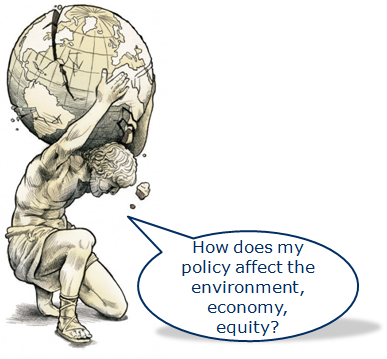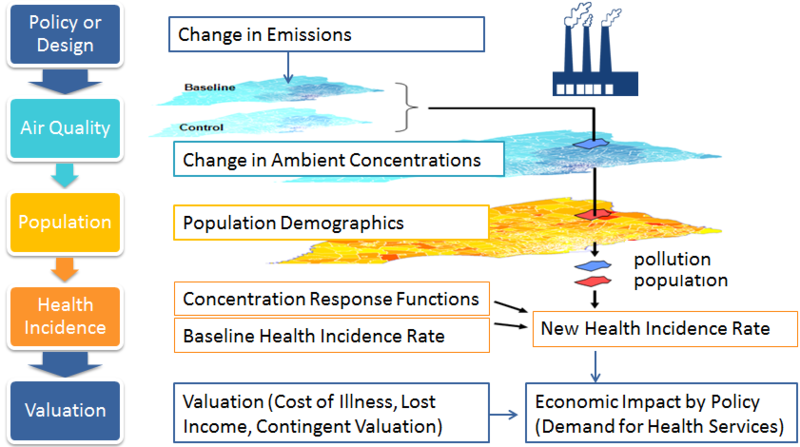Research Methods
We explore the air quality co-benefits of climate policy, and the mulitipollutant impacts of sustainabile infrastructure.
 Making sustainable decisions means balancing multiple goals: a strong economy, a clean environment, an equitable society. Policies that focus on one goal, e.g., climate change policy, can lead to big wins or regrettable losses for our other goals if we are not careful in our policy assessment process.
Making sustainable decisions means balancing multiple goals: a strong economy, a clean environment, an equitable society. Policies that focus on one goal, e.g., climate change policy, can lead to big wins or regrettable losses for our other goals if we are not careful in our policy assessment process.
Integrated assessment frameworks combining models of the economy and earth system have the power to make such synergies and trade-offs stark and concrete.
Saari Lab applies this powerful sustainability assessment tool to a key question: can air quality co-benefits justify climate policy?
There are increasing calls to consider the ancillary benefits for air pollution of climate policy – the benefits of reduced pollution are local, immediate, and affect human health. However, significant climate or energy policies can affect the economy and the multitude of air pollution sources in complex ways. Can we better understand these linkages to make more informed, robust decisions?
To explore this problem, we develop integrated assessment frameworks combining models of the economy and atmosphere with models of human health impacts.

Research Topics
Multipollutant impacts and benefits under policies for climate, energy, and transportation
Chang, Kelly M., Jeremy J. Hess, John M. Balbus, Jonathan J. Buonocore, David A. Cleveland, Maggie L. Grabow, Roni Neff, R.K. Saari, Christopher W. Tessum, Paul Wilkinson, Alistair Woodward, and Kristie L. Ebi. “Ancillary Health Effects of Climate Mitigation Scenarios as Drivers of Policy Uptake: A Review of Air Quality, Transportation and Diet Co-Benefits Modeling Studies.” Environmental Research Letters 12, no. 11 (2017): 113001. DOI: 10.1088/1748-9326/aa8f7b.
T. M. Thompson, S. Rausch, R.K. Saari, N.E. Selin, “Air quality co-benefits of sub-national carbon policies.” Journal of the Air & Waste Management Association, doi: 10.1080/10962247.2016.1192071.
R.K. Saari, N.E. Selin, S. Rausch, T. Thompson, “A self-consistent method to assess air quality co-benefits from US climate change policies.” Journal of the Air & Waste Management Association, 65, 74–89. doi:10.1080/10962247.2014.959139 (2015)
T.M. Thompson, S. Rausch, R.K. Saari, N.E. Selin, “Air Quality Co-Benefits of US Carbon Policies: A Systems Approach to Evaluating Policy Outcomes and Uncertainties.” Nature Climate Change, doi:10.1038/nclimate2342 (2014)
Sustainable infrastructure
W. Wang, R.K. Saari, C. Bachmann, “Regional Sources and Impacts of Atmospheric Emissions from On-Road Freight Using a Novel Integrated Modelling Framework”. (in progress)
F. Nasir, R.K. Saari, S.L. Tighe, “Environmental Life Cycle Costs of Sustainable Pavement Management Options Accounting for Atmospheric Damages” (in progress)
Torres-Machi, Cristina, Filzah Nasir, Jessica Achebe, R. K. Saari, Susan L. Tighe. “Sustainability Evaluation of Pavement Technologies through Multicriteria Decision Techniques”. (under review)
Yeung, J., Walbridge S., Haas C., R.K. Saari. 2016. “Understanding the Total Life Cycle Cost Implications of Reusing Structural Steel.” Environment Systems and Decisions, December, 1–20. doi:10.1007/s10669-016-9621-6.
Health impacts of air pollution under future climate
F. Garcia-Menendez, R.K. Saari, E. Monier, N.E. Selin. (2015). “Impacts of climate change and benefits of climate policy for U.S. air quality and health.” Environmental Science and Technology, 49 (13) 7580-7588
R.K. Saari, Y.F. Mei, E. Monier, F. Garcia-Menendez, “Effect of Health-related Uncertainty and Natural Variability on Health Impacts and Co-benefits of Global Policy.” (under review)
Environmental inequality; pollution and policy impacts by income group
R. K. Saari, T.M. Thompson, N.E Selin, Human Health and Economic Impacts of Ozone Reductions by Income Group.” Environmental Science and Technology. Online Publication January 11, 2017. DOI: 10.1021/acs.est.6b04708.
